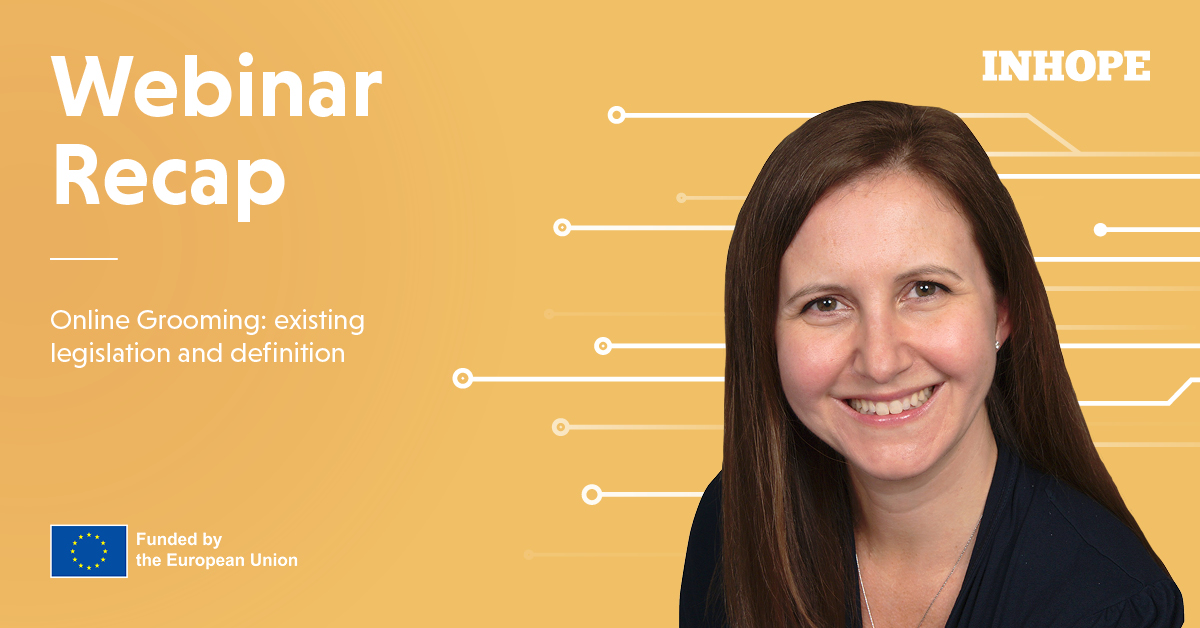Article
Events & Campaigns
Online grooming: existing legislation and the importance of a global definition recap
The 8th Expert Insights webinar of this season was led by Dr. Elizabeth L. Jeglic, who spoke about current gaps in the legislation of online grooming and advocated for the development of a global definition.
The session was kicked off with an insight into the current state of online sexual grooming. Dr. Jeglic shared that since the start of the pandemic there has been a worrying increase of 97.5% in reports of online enticements (online communication with a child for the purpose of sexual offence). Potential perpetrators noticed that young people are using the internet as their main tool of socialisation and began using this to their advantage by targeting their victims online. As of now, according to an estimation by the FBI, in the U.S. 750.000 people attempt to contact children for sexual purposes, every day. This striking number illustrates just how pressing the issue of online sexual grooming is. Dr. Elizabeth L. Jeglic elaborated, that to address the problem with the urgency it deserves, we need to discuss the lack of a harmonised global definition of online grooming and work to develop a unified legislative response.
"Our global response to this crime needs a new approach, or more children will continue to be placed at risk and suffer the trauma of abuse" - cited from Global Threat Assessment 2021.
The lack of a clear definition
To identify and prosecute a crime, it needs to be clearly defined. Currently, there are still many different terms that are used interchangeably to describe online grooming. "It is really important when we think about moving forward that we work on using the precise language and defining these terms for what they are" - Dr. Elizabeth L. Jeglic, Professor. Successively, the speaker shared and explained the terminology most commonly used in the United States.
Online enticement, is an umbrella term typically intended to describe online communication with someone believed to be a child with intent for sexual offence or abduction. This type of abuse often includes coercion with 'consensually' distributed imagery. Online solicitation entails the act of using the internet to contact minors for sexual purposes and generally refers to one-time contact that does not necessarily result in in-person meetings. Sexual grooming, in contrast describes a process in several stages with the goal of developing a 'relationship' with a minor that can be upheld to continue the abuse over a certain period.
Inconsistent legislative response
Dr. Elizabeth L. Jeglic explained that the fast-paced digital environment makes it increasingly difficult to keep up with appropriate legislative responses. She shared the model legislation and global review developed by ICMEC that identifies five characteristics that online sexual grooming legislation should entail:
- Exists with regard to the online grooming of children for sexual purposes.
- Provides a definition of grooming including online grooming and utilises computer- and internet-specific terminology.
- Criminalises online grooming, with the intent to meet the child online.
- Criminalises online grooming, regardless of the intent to meet the child online.
- Criminalises showing pornography to a child.
A global investigation showed that out of 196 countries only 24 met all of the established criteria. Out of 133 countries that did not have legislation for online grooming, a shocking 82 states met none of the above-mentioned guidelines.
What are the necessary next steps?
- Establishing a consistent definition of what is considered to be a child/minor. Currently, this varies heavily from country to country, which complicates international prosecution.
- There needs to be a harmonised understanding of the act of (online) grooming. All aspects of the legislation must be based on observable characteristics, as we cannot prosecute solely based on intent.
- (Online) grooming needs to be implemented into the penal code as it is rarely explicitly legislated.
- The process of (online) grooming needs to be criminalised, regardless of whether or not there was an intention to meet with the child.
A preventative approach
Dr. L. Jeglic emphasised that while we must advocate for legislative change, the global inconsistencies in the definition and prosecution of online grooming make it incredibly challenging to indict offenders. This is why it is crucial to increase our preventative methods by arming vulnerable groups with the necessary tools to protect themselves. The first step in achieving this is adding digital education to a standardised school curriculum: "We have to encourage schools to help teach children about online sexual grooming" - Dr. Elizabeth L. Jeglic, Professor. Every child is vulnerable to being targeted by online grooming attempts, but awareness of the most common strategies can prevent children from engaging with potentially threatening people. The goal is to facilitate honest, open conversations about digital safety and the dangers of online grooming.
In addition to educational facilities, technological platforms also must contribute their part in creating prevention initiatives for their audience. Dr. Elizabeth L. Jeglic proposed the idea that all users have to engage with educational materials concerning digital safety before they are allowed to join the platform. Moreover, it was suggested that tech companies should consider implementing sponsored posts throughout the usage of the platform which continuously inform and remind users about ways to safeguard themselves online.
For information on how to spot grooming and keep your child safe, or to seek professional help, contact your national helpline.

Photo by INHOPE
According to an estimation by the FBI, 750.000 people attempt to contact children for sexual purposes, every day.
'